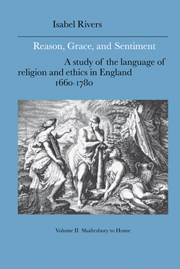Book contents
- Frontmatter
- Contents
- Preface
- Abbreviations
- Introduction
- 1 The true religion of nature: the freethinkers and their opponents
- 2 Shaftesbury and the defence of natural affection
- 3 Defining the moral faculty: Hutcheson, Butler, and Price
- 4 The ethics of sentiment and the religious hypothesis: Hume and his critics
- 5 The conflict of languages in the later eighteenth century
- Bibliography
- Index
1 - The true religion of nature: the freethinkers and their opponents
Published online by Cambridge University Press: 15 December 2009
- Frontmatter
- Contents
- Preface
- Abbreviations
- Introduction
- 1 The true religion of nature: the freethinkers and their opponents
- 2 Shaftesbury and the defence of natural affection
- 3 Defining the moral faculty: Hutcheson, Butler, and Price
- 4 The ethics of sentiment and the religious hypothesis: Hume and his critics
- 5 The conflict of languages in the later eighteenth century
- Bibliography
- Index
Summary
[The first Earl of Shaftesbury] conferring one day with Major WILDMAN about the many sects of Religion in the world, they came to this conclusion at last; that, notwithstanding those infinite divisions caus'd by the interest of the Priests and the ignorance of the People, ALL WISE MEN ARE OF THE SAME RELIGION: wherupon a Lady in the room, who seem'd to mind her needle more than their discourse, demanded with some concern what that Religion was? to whom the Lord SHAFTESBURY strait reply'd, Madam, wise men never tell.
Toland, ‘Clidophorus’, Tetradymus (1720), 94–5there's a Religion of Nature and Reason written in the Hearts of every one of us from the first Creation; by which all Mankind must judge of the Truth of any instituted Religion whatever.
Tindal, Christianity as Old as the Creation (1730), 50Natural Religion, justly so called, is bound up in Revealed, is supported, cherished, and kept alive by it; and cannot so much as subsist in any Vigor without it. To take away revealed Religion from it, is to strip it of its firmest aids and strongest Securities, leaving it in a very low and languishing State, without Lights sufficient to explain it, or Guards to fence it, or Sanctions to bind it.
Waterland, Scripture Vindicated, Part I (1730), 1–2- Type
- Chapter
- Information
- Reason, Grace, and SentimentA Study of the Language of Religion and Ethics in England, 1660–1780, pp. 7 - 84Publisher: Cambridge University PressPrint publication year: 2000

